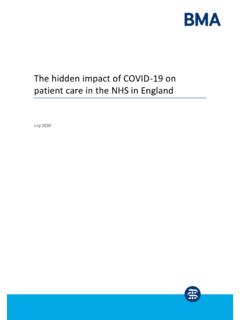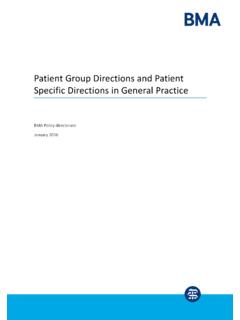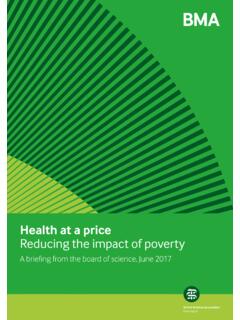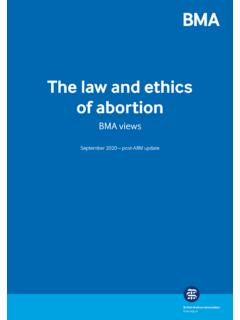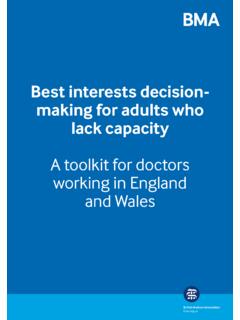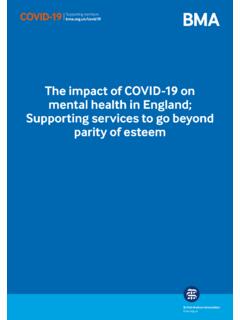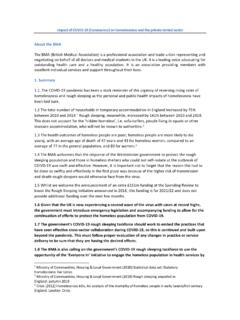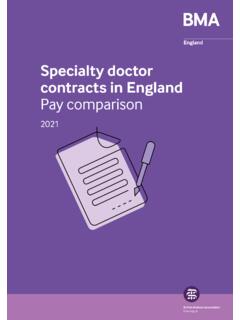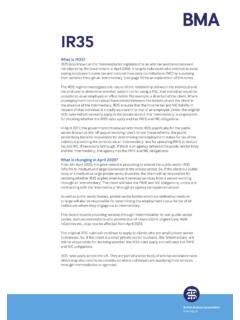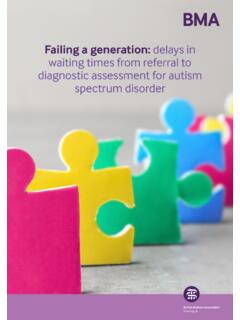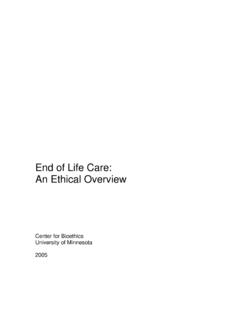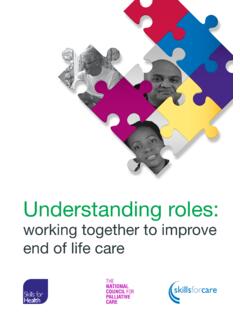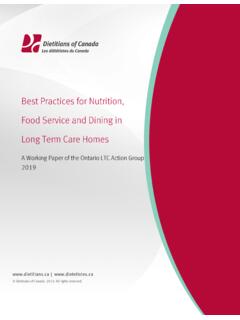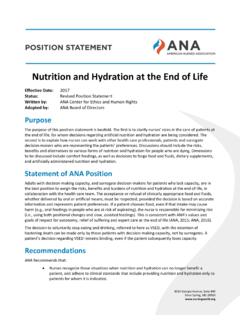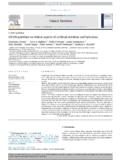Transcription of Clinically-assisted nutrition and hydration (CANH) and ...
1 Clinically-assisted nutrition and hydration (CANH) and adults who lack the capacity to consentGuidance for decision-making in England and Wales Endorsed by the General Medical Council We welcome this joint guidance which will support doctors in making ethically and legally sound decisions in the interests of patients. It provides practical advice to support decision-making in a complex, sensitive area of practice. As part of the BMA advisory group, we consider that the general principles and standards are consistent with our own guidance on Consent (2008) and Treatment and care towards the end of life (2010). This guidance is a valuable tool for healthcare staff, rather than a rule book, and it is not intended to set a threshold for GMC fitness-to-practise action. General Medical Council, development of this guidance was overseen by a core group made up of representatives of the British Medical Association, Royal College of Physicians, and General Medical Council and a number of experts appointed to advise the group on the basis of their expertise.
2 We are indebted to them for the considerable time and knowledge they gave in producing this guidance. Dr John Chisholm CBE, Chair of BMA Medical Ethics Committee (Chair of the Core Group)Sharon Burton, Head of Standards and Ethics, GMCRuth Campbell, Senior Policy Advisor (Medical Ethics and Human Rights), BMADr Chris Danbury, Consultant in Anaesthetics and Intensive CareVeronica English, Head of Medical Ethics and Human Rights, BMA Professor Celia Kitzinger, Co-Director, Coma and Disorders of Consciousness Research Centre, Cardiff UniversityDr Shuli Levy, Consultant Geriatrician and General Physician Paul McGough, Senior Associate (Healthcare Regulatory Team), DAC BeachcroftAlex Ruck Keene, Barrister, 39 Essex ChambersProfessor Lynne Turner-Stokes MBE, Consultant in Rehabilitation Medicine, Royal College of PhysiciansJessica Watkin, Policy Manager (Standards and Ethics), GMCT hanks are also due to the following individuals and organisations who were part of the wider professional consultative group, who were consulted during the development of the guidance, and who commented on earlier drafts.
3 Whilst their contributions were invaluable in helping to inform our views, it should not be assumed that the guidance reflects the views of all those who contributed. Dr Judith Allanson, Consultant in Neurorehabilitation Yogi Amin, Irwin Mitchell Dr Idris Baker, Association of Palliative MedicineIan Barker, Medical Defence UnionJim Beck, Office of the Official SolicitorDr Dominic Bell, Consultant in Intensive care /AnaesthesiaVictoria Butler-Cole, 39 Essex Chambers Naomi Campbell, Royal College of Nursing Jakki Cowley, Empowerment Matters Dr Stephanie de Giorgio, BMA General Practitioners CommitteeDepartment of Health and Social CareBridget Dolan QC, Serjeants Inn ChambersDr Aaron D Sa, Specialty Registrar in Anaesthetics and Intensive care David Edwards, Office of the Official Solicitor Dr Karen Elliott, Co-Managing Director of Gill-Thwaites & Elliott Consultants Professor the Baroness Ilora Finlay, Mental Capacity Forum Dr Helen Fidler, BMA Consultants CommitteeProfessor Rob George, Professor of Palliative CareProfessor Robin Gill, Emeritus Professor of Applied TheologyProfessor Raanan Gillon.
4 Emeritus Professor of Medical EthicsHelen Gill-Thwaites MBE, Co-Managing Director of Gill-Thwaites & Elliott Consultants Katie Gollop QC, Serjeants Inn ChambersDr John Gorst, Consultant in Intensive CareJoan Goulbourn, Senior Advisor Mental Capacity Policy, Ministry of JusticeDr Marion Gray, Consultant PsychiatristDr Zo Greaves, Deputy Chair of BMA Medical Ethics CommitteeDr Andrew Hanrahan, Consultant in NeurorehabilitationDharinee Hansjee, Royal College of Speech and Language TherapistsSusan Hardie, Office of the Official SolicitorProfessor Richard Huxtable, Professor of Medical Ethics and Law, Centre for Ethics in Medicine, University of BristolSuzi Kerrell-Vaughan, Independent Neurological Providers Association 2 British Medical Association/Royal College of PhysiciansDr Jatt Khaira, British Association of Stroke PhysiciansProfessor Jenny Kitzinger, Co-Director, Coma and Disorders of Consciousness Research Centre, Cardiff UniversityGavin Knox, NHS WalesMichelle Kudhail, Independent Neurological Providers Association Dr Julie Latchem-Hastings, Research Associate, Coma and Disorders of Consciousness Research Centre, Cardiff UniversityDavid Lock QC, Landmark ChambersPaula Mansell, care Quality CommissionProfessor David Menon, Head of Division of Anaesthesia, University of Cambridge Sophy Miles, Doughty Street ChambersMichael Mylonas QC, Serjeants Inn ChambersNaeem Nazem, Medical and Dental Defence Union of Scotland Dr David Nicholl, Association of British Neurologists Dr Zoe Oliphant, Clinical Fellow, care Quality Commission Camilla Parker, Partner, Just EqualityDr Marina Platts, Consultant in NeurorehabilitationRebecca Raeburn, Royal College of Occupational TherapistsSophia Roper, Serjeants Inn ChambersKatie Scott, 39 Essex Chambers Caroline Shehu-Pearce, Barts Health, Palliative care CNHS/Royal College of NursingDr David Smithard.
5 Consultant in Elderly MedicineDr Alison Stroud, Royal College of Speech and Language TherapistsProfessor Derick Wade, Professor and Consultant in Neurological RehabilitationDr Krystyna Walton, Consultant in Neurorehabilitation Dr Bee Wee, Consultant in Palliative Medicine Mr Robert Wheeler, Consultant Surgeon, Director of Clinical Law, University Hospitals Southampton We would also like to thank the many individuals and organisations who provided advice and who commented on an earlier draft of the guidance. Again, it should not be assumed that the guidance reflects the views of all those who s SocietyKiran Bhogal, Partner & Head of Healthcare, Hill Dickinson LLPB ritish Dietetic Association British Geriatric Society British Society of Rehabilitation Medicine Catholic Medical Association (UK)Sir William CharlesProfessor Hannah Cock, Professor of Epilepsy and Medical Education, St George s, University of LondonProfessor John Coggon, Professor of Law Dr Peter Critchley, Consultant in Neurology and Rehabilitation Medicine Compassion in Dying Jane Dale, Healthcare Inspectorate Wales Dementia UK Faculty of Intensive care MedicineHealth Education EnglandHospice UK Huntington s Disease Association Dr Judith Ibison, Reader in Primary care , St George s, University of London Intensive care SocietyProfessor Chris Jones, Deputy Chief Medical Officer for WalesDr Stephen Lewis, Consultant Gastroenterologist Dr Jonathan Martin, Consultant in Palliative Medicine Jill Mason, Mills & Reeve LLPM edical Ethics AllianceMedical Protection SocietyNursing and Midwifery Council 3 CANH and adults who lack the capacity to consent guidance for decision-making in England and WalesUK Parkinson s Excellence Network Dr Catherine Millington-Sanders.
6 Royal College of General Practitioners Dr Lucy Series, Wellcome Research Fellow and Lecturer in Law Dr Claire Stark Toller, Consultant in Palliative Medicine Amanda Swain, Vice Chair and Policy Officer, UK Acquired Brain Injury Forum Dr Andrew Wilcock, Clinical Reader in Palliative Medicine and Medical OncologyAll those who attended the consultative session on the guidance at the Independent Neurorehabilitation Providers Association conference, July 2018 All members of BMA committees and BMA Council who commented on the draft guidanceAll BMA members who contributed their views at focus groups in London and Cardiff, July other organisations participated in the consultation but have asked not to be listed here. We are particularly grateful to the individual family members with experience of decision-making around CANH who shared their experiences with guidance is published under the auspices of the BMA Medical Ethics Committee which considered drafts at various stages of its development.
7 The MEC s membership for the year 2017-2018 was:Dr John Chisholm CBE (Chair), General practice, London Dr Hannah Barham-Brown, junior doctor, LondonDr Charlie Bell, junior doctor, LondonDr Iain Brassington, Bioethics, ManchesterDr Mary Church, General practice, GlasgowProfessor Bobbie Farsides, Clinical and biomedical ethics, BrightonProfessor the Baroness Ilora Finlay, Palliative medicine, CardiffProfessor Robin Gill, Theology, CanterburyProfessor Raanan Gillon, General practice (retired) and medical ethics, LondonDr Zo Greaves (Deputy Chair), GP trainee, South TeesProfessor Emily Jackson OBE, Medical law and ethics, LondonDr Surendra Kumar, General practice, WidnesDavid Lock QC, Barrister, LondonDr Helena McKeown, General practice, SalisburyDr Mary Neal, Medical law and ethics, GlasgowProfessor Wendy Savage, Obstetrics and gynaecology (retired), LondonProfessor Mona Siddiqui OBE, Theology, EdinburghDr M E Jan Wise, Psychiatry, London Ex officio membersDr Andrew Dearden, treasurerDr Anthea Mowat, chair of the representative bodyDr Chaand Nagpaul CBE, chair of councilSir John Temple, president 4 British Medical Association/Royal College of PhysiciansContentsExecutive summary.
8 6 Figure 1: The decision-making The aim and scope of this guidance .. Why is there separate guidance for CANH? .. Scope .. Which decisions are covered? ..15 Decisions about CANH in the context of neurodegenerative conditions ..15 Decisions about CANH in patients with multiple comorbidities or frailty which is likely to shorten life expectancy, who have suffered a brain injury ..15 Decisions about CANH in previously healthy patients who are in VS or MCS following a sudden-onset brain injury .. Which decisions are not covered? ..16 Patients in whom CANH is not clinically indicated ..16 Patients who are expected to die within hours or days ..16 Patients for whom a decision to stop or not to start CANH is part of a broader decision about life -sustaining treatment .. Withdrawing or withholding? .. Physician-assisted suicide and euthanasia .. Format of the guidance ..18 Part one: general guidance for all decisions about Clinically-assisted nutrition and hydration (CANH)2.
9 Decisions about CANH: the decision-making process .. The legal context .. A proportionate approach to decision-making ..21 Figure 2: Independent scrutiny of decisions not to provide, or to stop, CANH in adults who lack capacity .. Who is the decision-maker, and who must be consulted? ..22 Advance decisions to refuse treatment ( ADRT) ..22 Health and welfare lasting power of attorney (LPA )..22 Clinician-led decision-making ..23 Who is responsible for making decisions? ..23 Who should be involved in decision-making?..24 The Court of Protection .. Health professionals with a conscientious objection .. Clinical assessments ..27 Factors to consider ..27 Uncertainty in care and treatment ..28 Initiating a trial of CANH .. Best interests assessments ..30 What are best interests assessments? ..31 Gathering information about the patient ..31 Ascertaining wishes, beliefs, values and feelings ..32 Weighing and using the information about the patient.
10 33 Documenting and sharing information about best interests assessments ..34 Pregnant women ..34 Figure 3: Best interests decision-making ..355 CANH and adults who lack the capacity to consent guidance for decision-making in England and Keeping decisions to provide CANH under review ..36 Who is responsible for ensuring that reviews take place? .. Second opinions ..37 The second-opinion clinician ..37 The role of the second-opinion clinician .. Managing disagreement and uncertainty ..39 Applications to the Court of Protection .. The withdrawal of CANH .. and reporting the death .. Governance and audit ..44 Internal governance ..44 External regulatory review ..44 National data collection ..44 Medical Examiners ..45 Part two: guidance for specific scenarios3. Decisions about Clinically-assisted nutrition and hydration (CANH) in the context of neurodegenerative conditions .. Clinical assessments .. Best interests assessments .. Second opinions.
